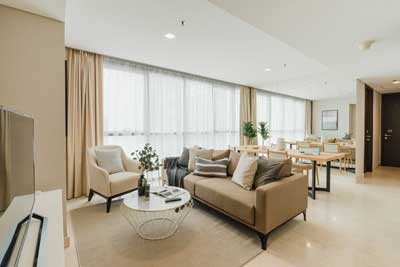Home » Practical Information » Housing Forum
Co-living Housing Options in Indonesia
 In Jakarta, we are seeing a growing housing trend focused on shared living which is not just a living arrangement but a lifestyle solution. This co-living arrangement is increasingly becoming the preferred housing solution due to it being more affordable than renting an entire house or apartment for yourself.
In Jakarta, we are seeing a growing housing trend focused on shared living which is not just a living arrangement but a lifestyle solution. This co-living arrangement is increasingly becoming the preferred housing solution due to it being more affordable than renting an entire house or apartment for yourself.
However, you might find that staying in a co-living space also allows you to enjoy a number of other benefits.
What are co-living spaces?
Coliving spaces are modern housing solutions that enable residents with similar intentions, interests, and values to share a residential space like a house or apartment.
Although the term coliving is only gaining popularity now, co-living is not actually new. Versions of co-living date back hundreds of years; the traditional longhouse concept was in fact a co-living arrangement. What is now driving the interest in this type of living arrangement is a combination of factors.
In a co-living space residents are not only getting a place to live that is already fully furnished and ready to move in, but also the facilities and amenities that come with it such as laundry service, room cleaning, and maintenance.
Flexible Payment Terms
In Jakarta, with the increasingly critical traffic situation, employees are looking for living arrangements that will allow them to reside closer to their place of work to reduce the amount of time spent in traffic.
The problem with this, however, is that any type of housing located close to the city’s Central Business District tends to be extremely pricy and often exceeds the budget of working-class employees. To compound the situation, normally apartment/home landlords require at least 6 months, but more often 12 months, payment in advance.
With a co-living space provider, you are allowed to pay with more flexible payment terms such as on a monthly basis, which is more ideal for tenants who are not able to commit to a full year's rent.
Roommates

Some people are hesitant to consider co-living housing arrangements as they may be concerned about what type of roommate they could be paired with. Companies are addressing this concern by renting co-living spaces and then having employees working for the same company paired as roommates.
This means that the person that you will be living with has already had a background check by the company. This also allows the company to supply a shuttle bus to the office from just one location.
An alternate and cost-effective way to rent an apartment is by going to a co-living provider and renting one bedroom in a 2-bedroom apartment. The other bedroom will be rented out to another tenant who could even be a housemate of their choice.
The roommates would still be paying a lower rent this way than they would have by renting the entire apartment, with the added advantage of flexible payment terms.
Cost Effective
Co-living offers peace of mind because the amount owed at the end of the month remains the same whether or not you have a roommate. In the traditional apartment sharing scenario, if a roommate moves out, the remaining resident is responsible for the entire rental amount. This is not true with co-living. The tenant is only responsible for renting the rooms that they are occupying. Regardless of the occupancy of other rooms, the rental amount will not change.
More for Your Money
Co-living tenants receive more value for their money. Rent is normally determined by the number of bedrooms that you use. This means that although you can use the co-living areas such as the kitchen, living room, laundry, and other public areas - you are not charged extra for this.
Generally speaking, these areas are much larger when it is a shared area than they would have been if they were just for a studio apartment. Therefore, tenants have the use of larger facilities without having to pay for or maintain them.
Often the management of the building will offer a maid or serviced option where the common areas are cleaned and serviced. This is an opt-in service and sometimes includes laundry service as well. This is often a very appreciated perk for busy working singles.
Opportunity to Network
Co-living areas are attractive to single people. Co-living spaces can promote a sense of community amongst the individuals who share the space. Tenants enjoy an instant network of potential friends and don’t just come home to an empty space.
Working people sometimes find it hard to make friends outside of the office, so this type of living allows them to meet people from different backgrounds, areas, and professions that otherwise may have been difficult, if not unlikely, to meet.
 Coliving Lowers Your Carbon Footprint
Coliving Lowers Your Carbon Footprint
Generally, coliving spaces share essential resources such as gas and electricity. By sharing such resources, co-living spaces reduce the energy consumption for appliances, like water heater and air conditioners. Individuals’ co-living spaces help implement a sustainable approach for energy consumption to ensure a reduced carbon footprint.
By living together, or in a communal type of situation, it might also be possible for residents to share their personal vehicles when traveling for work or leisure, lowering the emissions from transport. With the changing working environment that we are seeing in many large cities around the world, not only in Jakarta, co-living is providing a viable solution for the young working professional.
Photo Credits: Rukita
Last updated on August 7, 2023
